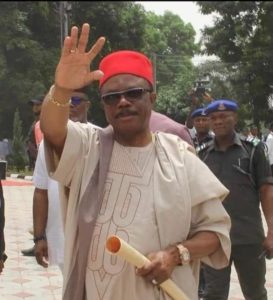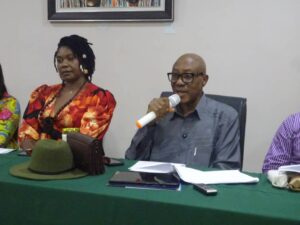Private Schools: A Breeding Ground For Igbo Language Haters

by Paul Chika Emekwulu
The private school system in Anambra state is a big partner in the Anglicizing movement which as defined in my earlier writing is a purposeful act by some speakers of the Igbo Language to write and spell their Igbo names using English alphabets. In addition advocates of this subtle movement also force their names to look English. Some people who abandon their Igbo surnames in preference for English baptismal names as surnames are also members of this informal movement which is gaining currency among the young as among the old as well.
Do we really need a research to confirm that private schools in Anambra State are breeding grounds for haters of the Igbo Language?
The answer is no.
When the Igbo Language is conspicously absent from your curriculum, your school is a breeding ground fọr haters of the Igbo Language.
When you punish or shame a child fọr speaking Igbo, your school is a breeding ground fọr haters of the Igbo Language.
When you equate the absence of an Igbo Language curriculum to high standard, your school is a breeding ground fọr haters of the Igbo Language.
These are all general intances. Let’s look at specfic cases.
Months ago I went to a local market in a town I regard as a town of interest, a few miles away from my house. There I met a young girl of about twelve years old. I wanted some bananas she was selling. I started the communication in Igbo, but she preferred to reply to all my questions and other utterances in English. Within me I said, “no problem.”
I started having problem when I asked her why she preferred having our transaction in English. With an angry and an unfriendly voice she said:
“I hate Igbo Language.”
I was dumbfounded. I asked her why and she said,
“I just don’t like Igbo Language.”
“Where do you go to school? “
Maybe thinking I was a native she simply said; “Immaculate Heart.”
My inquiry revealed “Immaculate Heart”‘ to be a mission private school less than a mile from where we were.
Throughout the rest of the time I was with her she never spoke a word let alone a sentence in Igbo. That was when I realized that her salvation level was very low. There is nothing wrong with speaking English but when a child has to hate her mother tongue at that level, both the parents and the teachers have questions to answer. There is nothing wrong with being bilingual with the Igbo Language as one of the languages. To some of us unfortunately, being bilingual is more attractive when French, German, Spanish etc. are involved.
Here is another example.
At a local private mission school English alphabets were conspicously displayed on the wall as one enters the school compound from the south east side. The Igbo alphabets that should have been displayed alongside the English counterparts were no where to be found. The school’s message to the students and the general public is a simple one:
That’s our preference, there is no place fọr Igbo alphabets here and therefore, consequently, we don’t have a place for Igbo Language in our curriculum. We don’t care if we are criticized for doing so.
My brothers and sisters, this is getting so bad. Why should we blame UNESCO for predicting that by the year 2050 the Igbo Language would be extinct?
Another instance.
At my local village school where I jog in the evenings whenever I have the time, I met two teenage boys. My jogging area is the front of an uncompleted upstair building. I jog from one end to the other. So the two boys went and stood at the west end. When I got to where they were I saw an opportunity for a teachable moment. I love teachable moments. Teachers should structure their lessons in such a way that students can experience “aha” moments everywhere and anywhere.
We wen’t through an introduction session.
“What’s your name?”
I asked one of them.
“Edwin Emmanuel.”
“Are you from Rivers State?”
He said, “no.”
“Are you Yoruba?”
He said, “no.”
I said those are the people I know too well that go by such names.
“Is Edwin an Igbo name?”. He said, “yes.”
“How?” He started looking at me without uttering a word. (He knew it wasn’t.)
I didn’t worry much about the second boy who introduced himself all with Igbo names. The other boy presented an interesting situation and I decided to explore that first.
Certain circumstances make people to change their first or surnames. Family feud is one of them and personal style is another and of course, among others.
“Was there any family misunderstanding that made the change of name necessary?”
“No,” he said.
“Before your present surname what was your previous?”
“Ezenwankwọ,” he answered.
“Who’s idea was it to change the name?”
“My father’s,” (of course) he answered.
He said the decision to change the surname was after the father moved back from somewhere in the northern part of Nigeria.
“What does Edwin mean?” I asked him.
He said something I couldn’t remember. (Probably it didn’t make any impression on me.)
I said but remember that every Igbo name has a meaning.
He nodded in agreement.
In answering to a question he said he would allow his children to do exactly what his father did. The same damage that has been done to him is already in wait for his children.
I told him to tell the father that he met someone who spoke vehemently against his decision to change his last name.
If this preferencial attitude continues among private schools, among parents, among their children and children’s children, why should we then be blaming the UNESCO for predicting that the Igbo Language would be extinct by the year 2050.
Parents are in a continuous habit of comparing Igbo Language with first, English Language and in some cases French, German etc. forgetting that:
“a language is like butterflies in the wind, Some fly higher than others. Each flies the best it can. Each is different. Each is beautiful. Why compare one against the other?“
Parents should stop equating high standard to lack of an Igbo Language curriculum. Being quite at home with Igbo Language is not identical to the death of any child.
On one hand, if private schools decide to equate high standard to a rich Igbo curriculum and on the other hand, if public schools could do the same, the parents will be left with a zero alternative. What’s next? Home schooling?
Both private schools and parents know better than they are currently doing, they should therefore do better.









